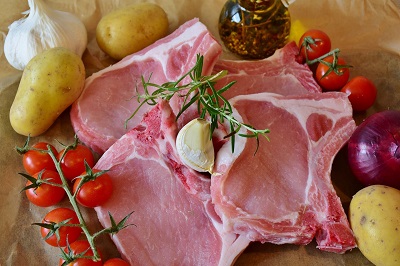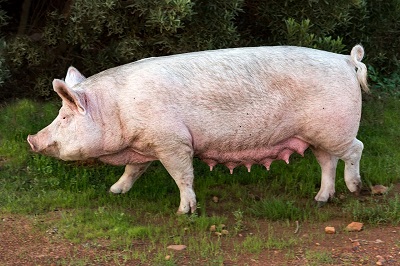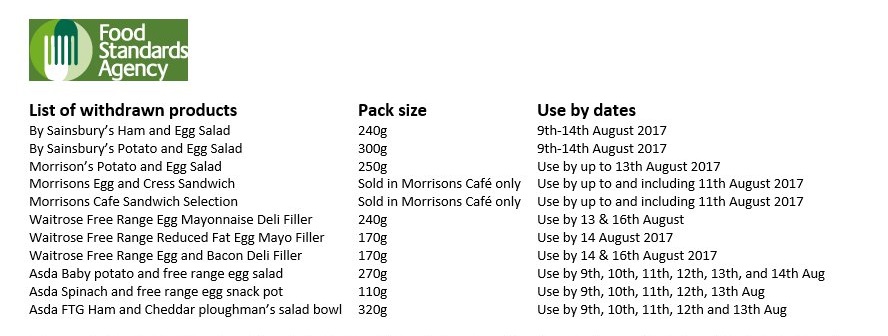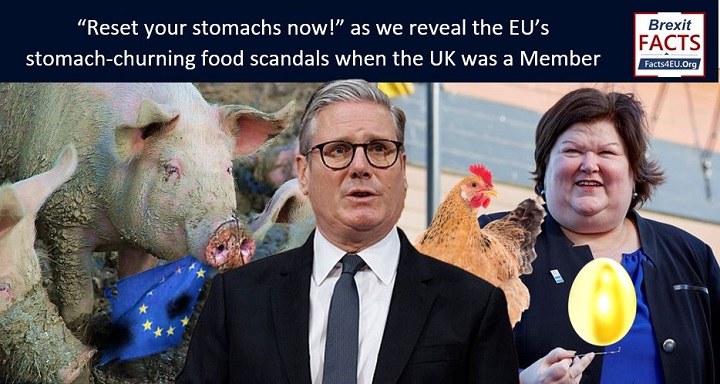“Reset your stomachs now!” as we reveal the EU’s nausea-inducing food scandals when the UK was a Member
Why did Sir Keir agree to align permanently with the EU’s record of pus-infected pork, poisonous eggs, and chlorine-washed veg?
Montage © Facts4EU.Org 2025
We’ll soon be back under EU law so we won’t even be allowed to ban what they export to us
At Sir Keir Starmer's 'Reset Summit' on Monday (18 May 2025) he agreed to give the EU control over every aspect of food production and safety in the UK. He also agreed to hand them control over what food we may now import from outside the EU. If “you are what you eat”, then we are all now EU citizens again.
“That’s a good thing,” say the Rejoiners. “The EU’s standards are much higher than ours and the fact we’re going to align – and to keep on aligning every time they change one of their rules – means we’re all going to get healthier and healthier. Just think of the savings for ‘our NHS’!”
One of the many problems with this joyful claim from the Rejoin lobby, as with just about every single claim it makes, is that is based on ignorance rather than on so-called ‘settled science’ or – heaven forbid – the evidence.
In this report we interrupt Rejoiners’ programming with three stomach-wrenching examples of what happened when the EU last had control over what we put in our mouths. Whilst we have been unable to resist the temptation of a few food gags (geddit?), the three examples below are based on solid evidence and they leave Sir Keir with some serious questions to answer.
1. Pus-infected pork with a splash of Tuberculosis material
Every year around eight million pigs are slaughtered for meat in the UK. The UK also imports pork meat from other EU countries. Meat from pigs' heads is recovered by specialised boning plants and goes into pies, sausages and other processed foods. Millions of us consume this meat many times each year.
In the same year the UK left the EU (2020) and we were in the ‘Transition Period’, (and therefore still eating EU-approved food), the latest EU food safety scandal reared its decidedly ugly head. This time it was over that staple of many people’s diets: pork.
Imagine you popped down to your local family butchers in the High Street (alright, let’s be honest, to Sainsburys or Morrisons in an out-of-down development) and there was a gleaming sign sporting the EU flag over a selection of gold-crusted pork pies: “Fresh in from France! Premium pork pies - with added pus from abscesses and a sprinkling of tuberculosis lesions!”
If the EU wants to portray itself as a responsible regulator of food safety standards, it might be thought that they would be continually strengthening food safety regulations in order to protect the public, not rowing back on them. This was certainly not true in the year the UK left the EU, according to the European Working Community for Food Inspection and Consumer Protection (EFWFC) which represents the EU's meat inspectors.
“Consumers are being exposed to an “avoidable risk” of disease after a reduction of official controls in food inspections of pig and poultry carcasses across the EU. Diseased meat is being eaten by consumers in the UK and EU, including pus from abscesses and tuberculosis lesions from pigs’ heads.”
- The European Working Community for Food Inspection and Consumer Protection (EFWFC), 15 Sept 2020
The EU lowered its food safety requirements
The EU introduced new measures for checking pigs entering the food chain. This reduced the requirement for checking pig meat from a thorough inspection to a visual-only inspection, and this was warned about
A visual-only inspection misses underlying diseases. In the words of Ron Spellman, the Deputy Secretary of the European Working Community for Food Inspection and Consumer Protection (EFWFC) which represents EU meat inspectors:-
“Inspectors stopped cutting lymph nodes in pigs’ heads, which are known to contain abscesses and tuberculosis lesions. Under previous systems, the pigs’ head would have been rejected for food, but now the meat is minced to make sausages and meat pies, spreading the pus from the abscesses and TB material throughout these products. I don’t think you can prove it’s safe to feed people abscesses, pus and TB material.”
Mr Spelman also speculated on the reasons for the EU's reduction in its food safety requirements. In reading his comment below it should be borne in mind that the agricultural lobby in Brussels is very large and very powerful.
“These changes are motivated not by science or a desire to protect the consumer but are politically motivated to give the meat industry what they want: the reductions and eventual removal of official independent meat inspection.”


The size of the problem
We looked at the Food Standards Agency's (FSA) report from that time. Here is what they said about 'foodborne diseases' - what most people would call 'food poisoning':-
“We estimate that there were 2.4 million cases of foodborne disease in the UK in 2018, with 222,000 GP presentations and 16,400 hospital admissions.”
- “Foodborne Disease Estimates for the United Kingdom in 2018”, FSA Report Jan 2020
By any measure this effect on public health from 'foodborne diseases' is highly significant.
So what did the EU Commission have to say about all of this?
The EU Commission's justification for the reduction in meat inspections is that the cutting up of pig carcasses as part of meat inspections increases the risk of harmful bacteria spreading onto meat.
A spokesperson for the European commission said: “The European Union retains some of the highest food safety standards in the world – this is a key priority. This is why the European Food Safety Authority provides expert scientific advice and recommendations while national authorities are responsible to carry out inspections in accordance with the official controls legislation.
“Any meat with lesions indicating an animal disease such as TB, or abscesses, or any pathological or organoleptic changes, must be considered as unfit for human consumption and not be placed on the market.”
The meat inspectors would doubtless agree with these worthy sentiments. However the problem as they see it is that the EU has reduced its safety requirements and ordered visual-only inspections of pigs. As Mr Spellman of the European Working Community for Food Inspection and Consumer Protection says: "There's no way to see those little abscesses, little tuberculosis lesions, without cutting those lymph nodes."
In the case of food safety standards above we have shown how yet again the EU claims one thing and does another.
2. Contaminated eggs – Making a quick Egg-xit for the nearest bathroom?
Ask a British person how they like their eggs and they will come up with a variety of answers. Boiled, fried, poached, scrambled, and many variations thereof. The one answer you are highly unlikely to hear is “contaminated”. Yet this is precisely what EU producers served up to UK consumers.
Brexit Facts4EU.Org Summary
The great EU, Belgian, and Dutch egg scandal
- In 2017, 700,000 contaminated eggs from Belgium and Holland made it into the UK’s food chain
- A variety of egg products had to be pulled from the shelves at Sainsbury's, Waitrose, Morrisons and Asda
- A massive scandal in the EU, but barely reported in the UK
Three years before the UK left the EU, a poultry scandal hit the Low Countries, specifically Belgium and the Netherlands, who each attempted to lay the blame at the other country’s battery hen farms, which resulted in millions of contaminated eggs entering the food chain. So widespread was this contamination that the UK's Food Standards Agency (FSA) discovered that around 700,000 contaminated eggs from Belgium and Holland had made it into the UK’s food chain.

© List created by Brexit Facts4EU.Org 2025
The UK Food Standards Agency's statement said :
“Some of the products made from these eggs will have had a short shelf life and will have already been consumed, however, we identified some that were still within the expiry date. These are now being withdrawn by the businesses involved. Attached is a list of products we have identified to date and we will update this list as our investigations proceed.”
EU bodies, Belgium, and the Netherlands accused each other of complicity
The Belgian Health Minister at the time
The office of the then Belgian Health Minister Maggie de Block claimed that they had alerted the EU on 6th July (2017) and that Dutch authorities had known about the contamination as long ago as November 2016. The Netherlands Food Safety Agency (NVWA) denied this but was less clear about why it had not alerted authorities in June 2017 when the accusations resurfaced.
Photo: Former Belgian Health Minister Maggie de Block

It then emerged that Dutch police had arrested two directors of a Dutch company in connection with the scandal.
EU Commission: 'Nothing to do with us'
Meanwhile the EU itself could not fully deny claims from Belgium that it had been told about the problem in early July 2017. On 10 August 2017 the EU Commission said:
“On July 6, there was a bilateral exchange between Belgium and the Netherlands within the framework of the so-called administrative support and cooperation system. The Commission does not actively monitor the exchange in the AAC as is the case with the Rapid Alert System for Food and Feed (RASFF).”
In effect, the Commission wanted to distance itself from the growing crisis, which involved millions of eggs in the EU, hundreds of thousands of which had made it into the UK's food chain.
3. Chlorine-washed fruit and vegetables? No problem if it's produced in the EU
Had your five-a-day yet today? Aren’t you glad you are eating healthily and that the chicken in your McNugget burger doesn’t come from orange, chlorine-washed Trumpland? Well, in that case it might be an idea to scrape off the salad before you tuck into it.
Brexit Facts4EU.Org Summary
The EU permits chlorine-washed fruit and vegetables
- The EU permits chlorine-washed fruit and vegetables
- The industrial washing of fresh fruit and vegetables is permitted in the EU
- Next time Rejoiner MPs and campaigners open a bag of prepared lettuce from Spain, they may wish to give that some thought
Imported food products from around the world into the EU – many offenders
Imported food products from outside the EU must comply with EU regulations, but of course only a small proportion are inspected. Over time, serial offenders may become subject to stricter controls.
To give readers some idea of the types of contaminated products which made it into our food chain while the UK was a member of the EU, below is a list of just some of them.
Brexit Facts4EU.Org Summary
Below is an example of processed fruit and vegetables
which were placed on the UK’s stricter inspection list:
- Preserved apricots from Turkey and Uzbekistan (increased control on presence of Sulphites)
- Dried apricots from Turkey and Uzbekistan (increased control on presence of Sulphites)
- Dried lemons from Turkey (increased control for presence of Pesticide residues)
- Frozen raspberries from Serbia (increased control on presence of Norovirus)
- Frozen sweet peppers from the Dominican Republic, Egypt, India and Turkey (increased control on presence of pesticide residues)
- Frozen other peppers from the Dominican Republic, Egypt, Thailand, India, Pakistan and Vietnam (increased control on presence of pesticide residues)
- Peanut butter from Bolivia, Gambia, Madagascar, Sudan and Senegal (increased control on presence of Aflatoxins)
- Groundnuts (peanuts) from Bolivia, Gambia, Madagascar, Sudan and Senegal (increased control on presence of Aflatoxins)
- Hazelnuts from Georgia (increased control on presence of Aflatoxins)
- Pistachios from the United States (increased control on presence of Aflatoxins)
- Dried goji berries from China (increased control on presence of pesticide residues)
- Frozen okra from India and Vietnam (increased control on presence of pesticide residues)
- Preserved turnips from Lebanon and Syria (increased control on presence of rhodamine B)
- Dried peppers from Sri Lanka (increased control on presence of aflatoxins)
- Dried grapes from Turkey (increased control on presence of ochratoxin A)
- Preserved vine leaves from Turkey (increased control on presence of pesticide residues)
These were all put on an EU Regulation, but only after they had been imported for a considerable period. They were not banned, merely subject to closer supervision.
Observations
Next week we will be explaining why the outline deal wich our Prime Minister has agreed with the EU on food, confirmed by the EU in their subsequent document released when the 'Reset Summit' had ended, is disastrous on every level. In today's report we have given a few examples of how the EU is not ahead of the UK on food safety. Unfortunately, what Sir Keir Starmer is set to agree with the EU goes a great deal further than this.
In non-technical language we will show why this is, and why his plans must be stopped at all costs.
Please, please help us to carry on our vital work in defence of independence, sovereignty, democracy and freedom by donating today. Thank you.
[ Sources: EU Commission | UK DEFRA | FSA | Die Welt | RTBF | AFSCA ] Politicians and journalists can contact us for details, as ever.
Brexit Facts4EU.Org, Fri 23 May 2025
Click here to go to our news headlines
Please scroll down to COMMENT on the above article.
And don't forget actually to post your message after you have previewed it!
Since before the EU Referendum, Brexit Facts4EU.Org
has been the most prolific researcher and publisher of Brexit facts in the world.
Supported by MPs, MEPs, & other groups, our work has impact.
We think facts matter. Please donate today, so that we can continue to ensure a clean Brexit is finally delivered.
Paypal Users Only - Choose amount first
Quick One-off
Monthly





Something to say about this? Scroll down for reader comments